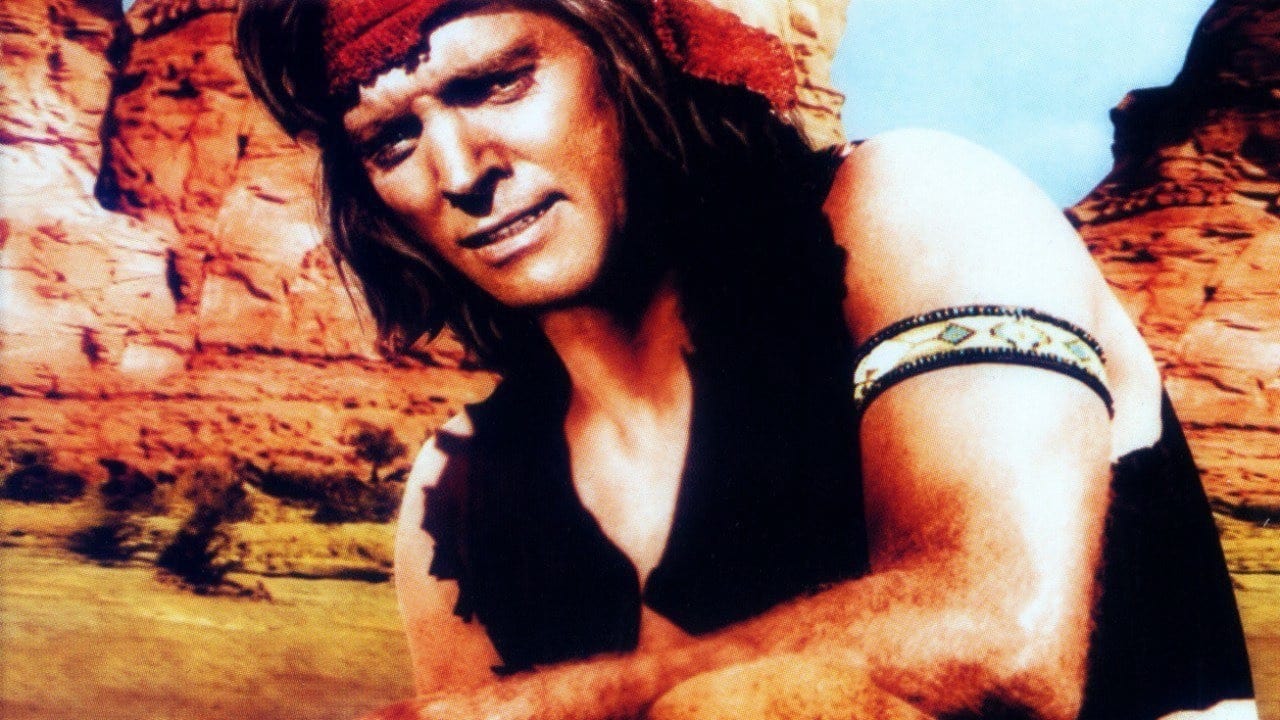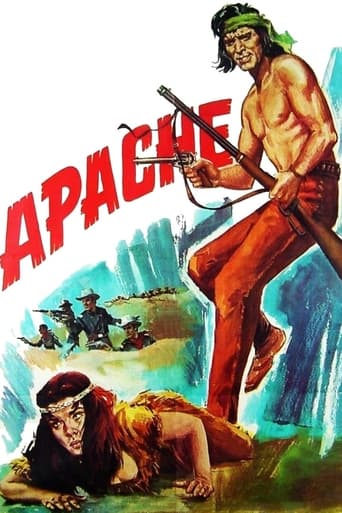

Wow! Such a good movie.
... View MoreWhat a waste of my time!!!
... View MoreWorth seeing just to witness how winsome it is.
... View MoreThis is a dark and sometimes deeply uncomfortable drama
... View MoreApache is directed by Robert Aldrich and adapted to screenplay by James R. Webb from the novel "Broncho Apache" written by Paul Wellman. It stars Burt Lancaster, Jean Peters, John McIntire, John Dehner, Charles Bronson and Paul Guilfoyle. Music is by David Raksin and cinematography by Ernest Laszlo."This is the story of Massai, the last Apache warrior. It has been told and re-told until it has become one of the great legends of the Southwest. it began in 1886 with Geronimo's surrender."Apache has problems, undoubtedly, from the casting of overtly bright eyed Americans in the principal Native American roles, to the shift into love story territory, and on to the studio enforced compromised ending, it's a mixed bag for sure. If you can get over these "issues" then there is still a lot to enjoy here. You're not a warrior any more; you're just a whipped Injun.Apache follows in the footsteps made by Broken Arrow and Devil's Doorway that saw a shift in how Native Americans were being represented on screen. The story of Massai (Lancaster) is a fascinating one, even if the movie doesn't quite be all that it can be. It shows him as a stoic and complex individual, fiercely determined in a last man standing type of way, while his confusion with the world he no longer understands - or cares to be part of - is expertly realised by Lancaster and Aldrich. One sequence has Massai walk through town observing the alien white man world at work, including Chinese folk busying themselves in a laundry, it's a smart piece of writing, proving that there is intelligence and points of worth in the story.You are like a dying wolf biting at its own wounds.Thankfully the film doesn't go too far the other way and paint Massai as a saint, we know what he is capable off, and he shows us his skills as a warrior as the story moves on. There's even a scene of major manhandling of Nalinle (Peters) that is uncomfortable viewing but actually integral to Massai's emotional state and how the story between the two unfolds. Here in is the problem, once Massai and Nalinle "fall" for each other the picture loses its edge, where even though Aldrich inserts some more action sequences, the grit, intelligence and narrative thrust has disappeared. This all leads to the ending, that as written originally should have seen a cold and dark finish along the lines of the brilliant Devil's Doorway. Instead we get something approaching cuteness and not as profound as the studio obviously thought it was.The casting of Lancaster and Peters gives the film athletic muscularity and beauty (respectively), certainly in Lancaster's case he throws himself into a role he actively courted to take him onto another acting level (he co-produced it with Harold Hecht). It takes some getting used to, but they provide wholesome characterisations even if they never convince as Native Americans. Support work from McIntire and Dehner is strong, but unfortunately Bronson (here billed as Buchinsky) is short changed by a screenplay that doesn't enhance a very promising character. Raksin's score blends the usual Indian thrums with a love theme that is not dissimilar to the love theme used by Alex North for Spartacus six years later. While Laszlo's Technicolor photography is grade "A" stuff where the landscapes (a number of locations were used, primarily in California) form a telling part of the plotting. Problems for sure here, and in truth it's the weakest Western made by the Aldrich/Lancaster pairing, but it has good strengths, it was a financial success and it's a story well worth being told. 7/10
... View MoreApart from Burt Lancaster's macho warrior performance, this movie is also saved by Robert Aldrich's direction. It's not brilliant in any sense, but pure enough to tell a story with some unique moments that give it his trade mark. Also the subject matter of an Indian being a hero was not common in the 1950s. It was a brave attempt to create empathy for the Indian Warrior, but it was not difficult because Burt Lancaster played it perfectly in a heroic campy style. I know, white folks playing Indigenous roles can sometimes put you off, but because of the time period it was made in, I decided to let it go and enjoy this Western romp because Lancaster is my all time favorite actors, and I was always interested in Aldrich as an accomplish director who had his own style that suited this film to perfection.
... View MoreApache is one of the first Hollywood films which dealt in a serious, thought-provoking and openly sympathetic way with the suffering of the native Americans as a consequence of the white man's expansion to the West. It is interesting to watch this film side by side with, for instance, John Ford's silent classic The Iron Horse, as we can see two opposite approaches to the history of the American West in the late 19th century. While Ford's epic production is a hymn to white man's progress and to the expansion of civilization to the wild, unexplored territories of the United States inhabited by the Indian nations, Apache is a touching drama about the desperate fight for survival of those same Indians, who were ruthlessly driven out of their ancestral lands and ways of life by the stern advance of material progress. The plight of the Apache nation is embodied by the central character of the film, the strong, stubborn, freedom-loving and nobly human Indian warrior Massai, played by the actor Burt Lancaster, who was also the inspirer and producer of the film. Unwilling to accept personal slavery and what he deems as the total humiliation of his nation after Chief Geronimo's surrender to the U.S. Army and the confinement of the Apache tribes to the reserve, Massai decides to start a one-man fight for human dignity and freedom and becomes a solitary outlaw at war with the local U.S. Army garrison.The film is certainly worth watching, not only because of the human interest of the story itself, but also as a well-crafted piece of cinema. Apache is the first great movie by the director Robert Aldrich, who in that year of 1954 would score double and reward us with another masterpiece, the unforgettable Veracruz, also with a Burt Lancaster in absolute state of grace as an actor, this time teaming with the veteran Gary Cooper.If in Veracruz Lancaster gave as a memorable performance as the attractive villain Joe Erin, here he is no less powerful as the honest and indomitable warrior Massai. At his side, also good performances by Jean Peters in the role of the faithful, ever-loving and determined squaw Nalinle, and John McIntire as the hard-boiled, cynical Indian-hunter Al Sieber, in a role that prefigures the twilight heroes of Peckinpah's films.All in all, a classic of the Western genre which inaugurated Aldrich's later shining career.
... View MoreFollowing Geronimo's surrender, Massai is the last Apache warrior who refuses to bow down to the white man. Escaping from a prison train, he returns to his homeland in New Mexico, attacks the local fort and escapes into the hills with Nalinle, the squaw who loves him. But tribeless, homeless and pursued, how long can he survive ?This is one of those rare fifties westerns which tries, within the traditions of the genre, to portray American Indian culture with accuracy and sympathy (see also Sam Fuller's Run Of The Arrow), and was the first of three great westerns made by Aldrich, Lancaster and producer Harold Hecht (the others being Vera Cruz and Ulzana's Raid). It has three fine performances; blue-eyed Lancaster is physically dazzling as the uncompromising Massai, who is noble, cruel, tireless in his quest for freedom, and tortured by the defeat of his people. Peters, little-known now but a major star in her day (and Mrs Howard Hughes), is terrific as the woman who understands Massai's conflict and loves him despite it. And McIntire (the sheriff in Psycho) is solid as the weary, hard-bitten tracker who has devoted his life to both understanding and defeating Apaches. Watch too for Bronson in a small role, billed here under his real name, Charles Buchinsky (he adopted his more famous moniker from 1955 onwards). Ernest Laszlo's photography of the California and Arizona scenery is fabulous, and Aldrich's trademark themes - machismo, independence and injustice - are all present and correct. This was his third movie and his first cowboy flick, and thematically is one of the most important westerns ever made.
... View More